#1916 Series
Explore tagged Tumblr posts
Text
#OTD in 1916 – Aftermath of the Easter Rising.
The National Museum holds many of the last letters written by the men executed in Kilmainham Gaol in May 1916 for their part in the Rising. The collection includes Pádraig Pearse’s letter to his mother, and letters from Con Colbert, Michael Mallin, Eamonn Ceannt and others, written to family and friends. All these letters have common themes; a final goodbye to loved ones, a sense of acceptance of…

View On WordPress
#1916 Easter Rising#1916 Series#Éamon De Valera#Boland’s Mill#Con Colbert#Constance Markievicz#Court-martialled#Dáil Eireann#Declan Kerr Artwork#Eamonn Ceannt#Easter Rising Aftermath#James Connolly#Kilmainham Gaol#Michael Mallin#Michael O&039;Hanrahan#National Museum#Padraig Pearse#Seán MacDiarmada
5 notes
·
View notes
Text

Hilma af Klint (Swedish, 1862-1944), The Parsifal Series, Group I, No 1. 2 October 1916. Watercolour and graphite on paper, 25 x 26cm.
1K notes
·
View notes
Text













The Mysteries of Myra (1916)
Consultant occulte de la serie aleister crowley
20 notes
·
View notes
Text


Louis Feuillade, {1916} Judex - Episode 11: L'Ondine (The Water Goddess)
#film#gif#series#louis feuillade#judex#l'ondine#the water goddess#1916#silent cinema#silent film#1910s#male filmmakers#france#people#men
12 notes
·
View notes
Text

Henry ‘Indiana’ Jones, Jr. as Corporal Henri Defense - The Adventures Of Young Indiana Jones (1992)
#1992#1916#film#series#TV show#television#WWI#The Adventures Of Young Indiana Jones#Sean Patrick Flanery#Indiana Jones#Indy#Henry Jones Jr.#Corporal Henri Defense#Henri Defense#Ronny Coutteure#Remy Baudouin#George Hall#Old Indy#Richard Ridings#Andre#Battle Of The Somme#Somme#France#Belgium#German Empire
27 notes
·
View notes
Text

Tom Sturridge in The Sandman (2022) Sleep of the Just
S1E1
Morpheus, the Endless one who is the Master of Dreams, is trapped in the mortal world by a human sorcerer. The world is thrown into chaos without the power of dreams, and Morpheus must escape and regain his power... but can he do so in time?
*In the comics, Dream was imprisoned for 70 years (1916-1986). In order to bring the story up to the present day, this was changed to "over a hundred years." To accommodate this, the ruby is said to prolong people's lives, a trait it did not have in the comics.
#The Sandman#tv series#2022#Sleep of the Just#S1E1#Morpheus#Dream#Endless#1916#sorcerer#England#dreams#magic#imprisonment#raven#Tom Sturridge#supernatural#dream realm#dream world#sleep disease#drama#fantasy#horror#scifi#mystery#based on a comic book#just watched
6 notes
·
View notes
Text
Alexei chilling with his tutors and friends, c1916
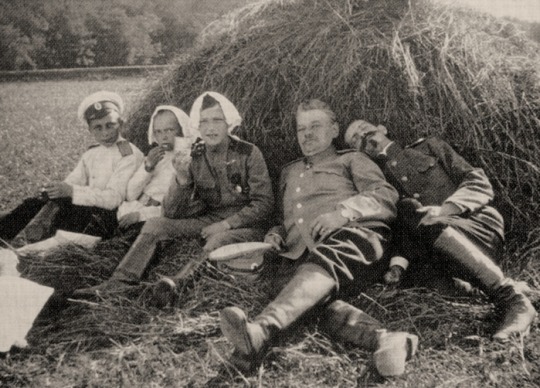
Also, how cute is Gilliard napping on PVP lol
#Alexei Nikolaevich#PVP#Pierre Gilliard#Agayev#Makarov#Romanov#Tsarevich Alexei#1916#Stavka#Mogilev#Russian history#Romanov family#my own#Petrov#Peter Vasilievich Petrov#series
34 notes
·
View notes
Text

NEGLECTED MURDERESSES SERIES

Angelica Transome — so disposed of her infant brother that he was not found until many years later (Nether Postlude, 1889).

Miss Elspeth Lipsleigh — eventually succeeded in causing the death of Arthur Glumm in Towage Regis, 1892.

Nurse J. Rosebeetle — tilted her employer out of the wheelchair and over the cliff at Sludgemouth in 1898.

Mrs. Fledaway — laced her husband's tea with atropine in the spring of 1903 at Locusts, near Puddingbasin, Mortshire.

Sarah Jane (“Batears”) Olafsen — hacked to collops nineteen loggers between March 1904 and November 1907 in and around Bindweed, Oregon.

Madame Galoche — in May 1911 added a tin of insecticide to a potate purée Crécy aux perles at the soup kitchen she operated for the indigent of Berchem-Sainte-Agathe, Belgium.

Miss Emily Toastwater — smothered her father after evening prayers, London S. W. 7 (1916).

Mrs. Daisy Sallow — eviscerated her daughter-in-law with a No. 7 hook afterwards crotcheting, over the course of three evenings her shroud in snowflake pattern (1921).

Natasha Batti-Loupstein — pulverized a paste necklace and sprinkled it over a tray of canapés, Villa Libellule, Nice, 1923.

Lady Violet Natheless — strangeled the hon. Opal Gentian at Gilravage Hall on Midsummer's Eve, 1925.

Lettice Finding — shot Edgar Cutlet, whose mistress she was, during the interval of a touring repertory company production of Rosmersholm in Manchester 1934.

Miss Q. P. Urkheimer — brained her fiancé after failing to pick up an easy spare at Glover's Lane's, Poxville, Kansas, 1936.
⁓⁓⁓⁓⁓⁓⁓⁓⁓⁓⁓⁓⁓⁓⁓⁓⁓⁓⁓⁓⁓⁓⁓⁓⁓⁓⁓⁓⁓⁓⁓⁓⁓⁓⁓⁓⁓⁓⁓⁓⁓⁓⁓⁓⁓⁓⁓⁓⁓⁓⁓⁓⁓⁓⁓⁓⁓
Edward Gorey (1925–2000) - Dogear Wryde Postcards: Neglected Murderesses Series, 1980
#edward gorey#dogear wryde#neglected murderesses series#dark art#illustration#murder#crime#black humor#art#drawing#postcards
491 notes
·
View notes
Text

(TW injury description)
I am SO glad you asked I lose my mind over this man. Sidney Beldam! He’s most known for his miraculous recovery from a major facial injury sustained while he served as a young sergeant in the First World War. If you’ve read the Facemaker by Lindsay Fitzharris you might recognise him! Sources differ slightly about his story, so I’ve pieced it together as best I could. The photos below were from about February 1919!
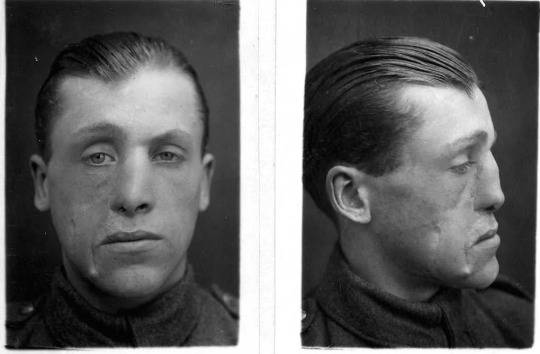
Born in 1897, Sidney was about 17 living with his mother in Cambridge, England when the Great War commenced. While he didn’t enlist initially, he was soon conscripted when it came about in 1916 though thankfully he was in a non-combatant role driving lorries transporting soldiers to boats headed for France. It’s where he learned he enjoyed driving! However in April 1917, Sidney was transferred to the Machine Gun Corps and eventually rose to the rank of sergeant where only 7 months later, his life would change forever.
During the battle of Passchendaele, one of the muddiest most gruelling segments of the war, Sidney was on the frontlines when a shell burst, sending a shrapnel fragment tearing diagonally through his nose and the right side of his face. The young soldier collapsed face first into the mud which ended up saving his life as falling backwards would have caused him to choke on his own blood. For three days Sidney laid in a mangled heap floating in and out of consciousness while vermin scurried about his body and the other dead and wounded around him. No one would ever know the details of those agonising three days, but the trauma he experienced there left him with a lifelong phobia of rats and cockroaches. After the initial wounded had been cleared out, a wandering band of stretcher bearers discovered Sidney alive after one man touched him with his boot fully expecting him to be dead. Miraculously, he was still clinging to life.
The 19 year old sergeant was rushed down the line and then transferred to two different military hospitals where his wounds were hastily stitched in an effort to save his life before infection could spread. Unfortunately, closing the gap where he was missing flesh in his cheek caused his upper lip to be pulled into a sneer and a sunken depression formed where most of his nose was missing around the bridge. Still, he was lucky to be alive, which he later used to remark. Well he was luckier still as he would be transferred to Sidcup military hospital in Kent where he would become a patient under Sir Harold Gillies, the man often considered the pioneer of modern plastic surgery. When he arrived at hospital in 1918, his wounds were healed but his face still bore the heavy trauma of his experience. If you want to see his photographs upon arrival, I won’t post them here but if you search his name, the photos are everywhere. IMO they’re not graphic but I know it can upset some people.
Gillies went to work trying to restore Sidney’s face. This required him to reopen the wound in his cheek where a skin flap was grafted to allow his upper lip to return to normal. He also folded down a skin flap from his forehead in order to create a new nose. Behind his facade, a series of tubes and canals had to be inserted for proper sinus drainage and other unnamed functions. While his initial handful of surgeries did most of the work to reconstruct his face, Sidney underwent over 40 surgeries between 1918 and the 1930s, some reconstructive and some to evacuate the tubes behind the flesh, meaning the common cold was a routinely painful affliction for him. Gillies understood operations were traumatic for the men at Sidcup, especially since most required more than one, and so made a point about creating a lighthearted ward environment, one Sidney says was quite jolly with the staff doing everything they could to make them feel comfortable and dignified as possible. And while I thought the topmost photos were the most updated case study photos for his recovery, I stumbled upon another set from 1920 in the Faces of War by Andrew Bamji I have not seen posted anywhere!
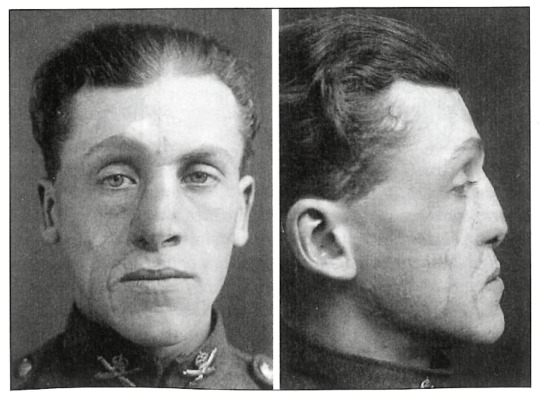
And lads listen. In such a sweet little twist, while Sidney was still recovering from the bulk of his major surgeries, a local pianist by the name of Winifred volunteered to play for the resting servicemen, all of whom had some form of disfigurment or amputation. Carrying in her sheet music, she and Sidney laid eyes on each other for the first time and she later remarked how his smile instantly lit up the whole room! For them, it was love at first sight. The two were soon married, and although it was in the 1920s, I don’t have an exact year for this. This most likely came after Sidney was finally discharged from service in 1921. There is a photo of their wedding and y’all look how SWEET!!
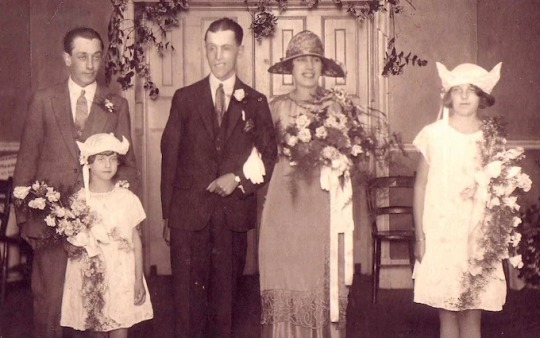
Between his initial surgeries and army discharge, Gillies asked if Sidney would be his personal chauffeur, an offer he took up quickly as he loved driving from his time with lorries during the war. One somewhat humorous account tells of Gillies—who was a bit scattered at times—asking Sidney to renew his driver’s license as the surgeon left it until the last day to take care of; Sidney in a rush waited in a long line at the county hall before jumping the queue and begging the administrator to expedite his employer’s license as it was needed to drive him to the hospital the next day. The man refused, even for a surgeon to get him to his patients. Sidney went to another staff member who was friends with Gillies and begged him the same. The man cheerily agreed but was still in need of a signature from the stubborn administrator who again refused... at least until he found out Harold Gillies nearly won a golfing championship, at which point he took Sidney to his personal office to expedite the license as he was happy to do business for a skilled golfer (apparently saving people’s lives doesn’t matter as much??). A no doubt perplexed Sidney was finally able to get back to the hospital on time!
After his army discharge and most likely about the time of his marriage, Sidney moved back to Cambridge where he worked for the council as a rent collector. He was so well liked, apparently even from the people he collected from, that he soon worked his way to Housing Manager for Cambridge. About this time, he had a daughter, Pam. Every account I read of him, people gush about how sweet he was. His wife recalls how Sidney was always adored by all his family and friends. His granddaughter Marilyn McInnes in an interview said, “He was the most warm and optimistic and loving man. I adored my grandfather, I was constantly on his lap as a small child. I never noticed anything funny about his face, I guess I thought all grandads looked like mine.”
Sadly, Sidney Beldam passed away from cancer at about 80 years old in 1978. But considering the man was given 6 months to live and ended up living for 60 years more surrounded by a large and loving family, I’d say he certainly had a full life. There is a picture of him and his wife in the 60s and they are absolutely charming!!
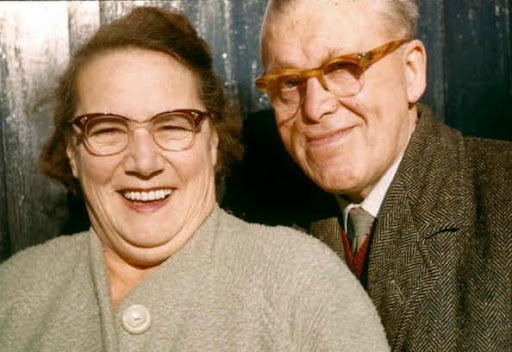
But anyway that’s me done rambling I’ve a massive crush on him. His story makes me genuinely happy to tell and I’m so glad you asked!
#I love love love this man sm he’s just described as this ray of sunshine!!#I want to put him in my pocket#And the story of him and his wife like actually kill me that is so cute#I’m so happy he was able to live a full life#Also yeah lads he is so fine ngl when I saw him in that book I was like WOW#he has such gorgeous eyes and I love his nose#and his smile#wwi#world war 1#sidney beldam#history#wwi medicine#injury tw#medical tw#long post
493 notes
·
View notes
Note
Hey Neil,
We saw Edwin almost kiss someone male presenting in the trailer and over several comic interpretations Edwin was always implied/or on a journey where he finds out about his sexuality or repressed it. I do not remember Edwin being implied queer in your sandman comic or maybe I was just too young when I read it to be able to catch the hints. So was it always your interpretation or did other authors add onto your interpretation of the character?
Btw I really love Edwin and his journey through the comics, as a person that comes from a really homophobe and transphobe place where I had to repress and hide a lot before I came to terms with who I am, so I am really pleased about the turn which his character took either way.
I don't think the Edwin in Season of Mists was in there for long enough for us to learn much about him except how he died (being sacrificed by other boys in a pact with a demon in 1916) and to watch him nurse the dying Charles Rowland and bond with him.
Since then, from his appearance in The Children's Crusade on, we've been learning who Edwin Payne is and what makes his tick.
For me the TV series is another step on the journey.
568 notes
·
View notes
Text
What is Edwin Payne reading? : a closer look.
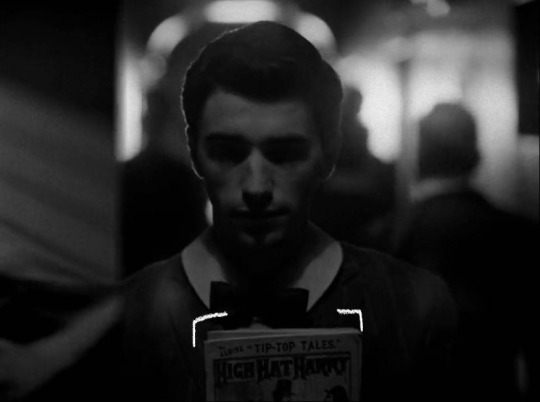
From the flashback scene in the show, we get this very short shot of Edwin walking down the halls. Now, what he is reading tells you all about the Dead Boy Detectives’ love for detective and adventure stories. He is carrying a penny novel! (also known as dime novel in the US- and the names are due to their cheap prices of, you guessed it! One penny or one dime each) Precisely no. 87 of the “Aldine Tip-Top Tales”.
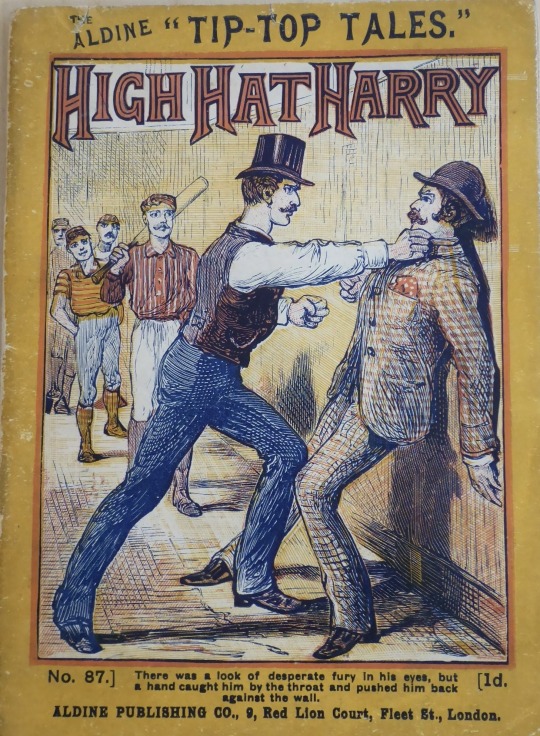
But, what were the Aldine Tip-Top Tales you might ask yourself. Well, originally the name was:
Tip Top Detective Tales and it was one of the Aldine Publishing Company's many library series produced to capture the fancy of the youth of Great Britain. This particular one ran from 1910 through 1912 when it morphed into just Tip Top Tales, produced to include stories of adventure, as well as those of criminal content. With one exception, all of the novels included in the series were published anonymously. (The exception: Glittering Gold! by Emile Gaboriau -Tip Top Detective Tales #4).

The Aldine Publishing Company was founded by Charles Perry Brown (1834-1916).
Some other titles included:
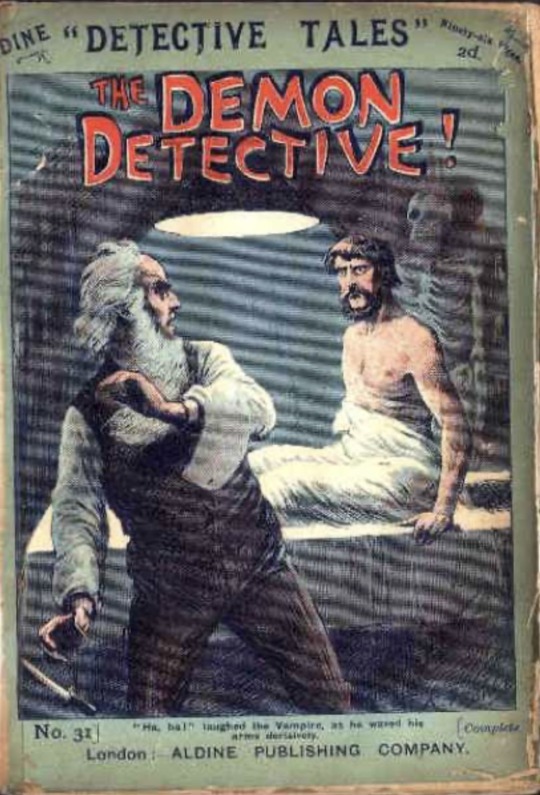



But, we see Edwin reading something else:
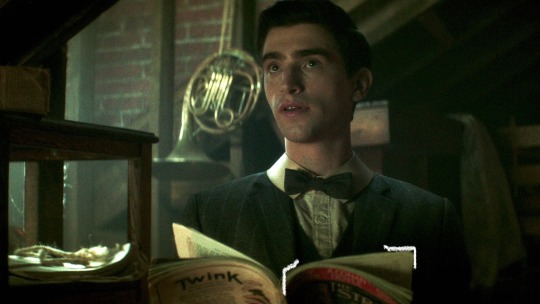
Which happens to be The Strand Magazine! And this very one for this shot.

The Strand Magazine was a British monthly magazine published from january 1891 to march 1950 (711 issues) in its original version (a new version of the magazine has been edited from 1998). George Newnes Ltd. was the publisher of the magazine and it was edited by Herbert Greenhough Smith from 1891 to 1930, then by Douglas Edward Macdonald Hastings.
Arthur Conan Doyle was a huge contributor with novels, short stories, poems and articles.
The Strand Magazine was also published in the United States from february 1891 through february 1916 but with sometimes different content.
Between 1891 and 1930, The Strand Magazine published no less than
• 121 short stories
• 70 articles
• 9 novels
• 2 interviews and 1 poem written by Arthur Conan Doyle.
And just in case you did not know who Arthur Conan Doyle was, well, let me just leave some of his works here as well, originally published in the Strand:

And these are just two of the infinite variety of novels Edwin Payne owns. :)
#dead boy detective agency#dead boy detectives#edwin paine#edwin payne#charles rowland#george rexstrew#jayden revri#the sandman#aldine tip top tales#detective tales#sherlock holmes#arthur conan doyle
403 notes
·
View notes
Text
Eamon Bulfin, the Irish-Argentinian who hoisted the Green Flag of the Republic over the GPO.
Eamon Bulfin was an Argentine-born Irish republican. A former pupil at Pádraig Pearse’s school St Enda’s (Sgoil Éanna), in Rathfarnham, Dublin. Bulfin was a member of the Irish Volunteers and the IRB and along with some fellow St Enda’s students created home-made bombs in the school’s basement in preparation for the Easter Rising. He was stationed in the GPO for the Rising and raised one of the…
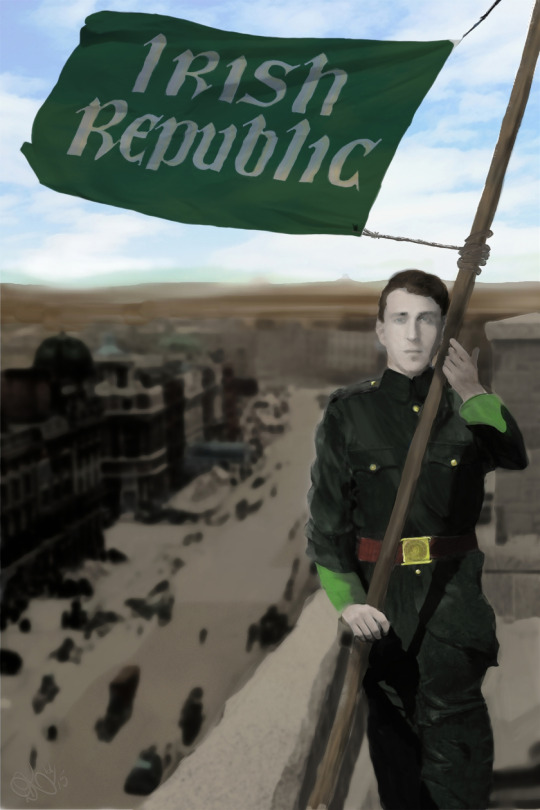
View On WordPress
#1916 Easter Rising#Éamon De Valera#Bulfin Road#Declan Kerr Easter 1916 Series#Dublin#Eamon Bulfin#Frongoch prison#General Post Office#Green Flag of the Republic#Inchicore#IRB#Ireland#Irish Argentinian#Padraig Pearse#St. Enda&039;s
11 notes
·
View notes
Text

Hilma af Klint (Swedish, 1862-1944), The Parsifal Series, Group I, No 49 'Detail of the small pearls'. 1 November 1916. Watercolour and graphite on paper, 25 x 27cm.
64 notes
·
View notes
Text

Retrato de Unica Zürn (Berlín 1916 - París 1970) intervenida por Rocío Bueno para su serie Ancestras.
286 notes
·
View notes
Text



Louis Feuillade, {1916} Judex: Prologue
#film#gif#series#louis feuillade#judex#prologue#1916#silent cinema#silent film#1910s#cemeteries#people#men#male filmmakers#tinted#france
17 notes
·
View notes
Text

Swimming girl, series "In Light and Sun", 1940 - by Kurt Reichert (1916 - 2006), Austrian/American
2K notes
·
View notes